He left his job in banking to take over his father's pork rib soup stall in Singapore. After 3 years of Michelin's Bib Gourmand status, he has no regrets.
Marielle Descalsota

- Joo Siah Bak Kut Teh is a food stall that's been selling pork rib broth in Singapore for three decades.
- Ryan Quah quit his banking job to take over his father's business — he's the second-generation owner of the stall.
Ryan Quah, 40, runs a hawker that's been selling bak kut teh — the famed pork rib soup — for more than 30 years.
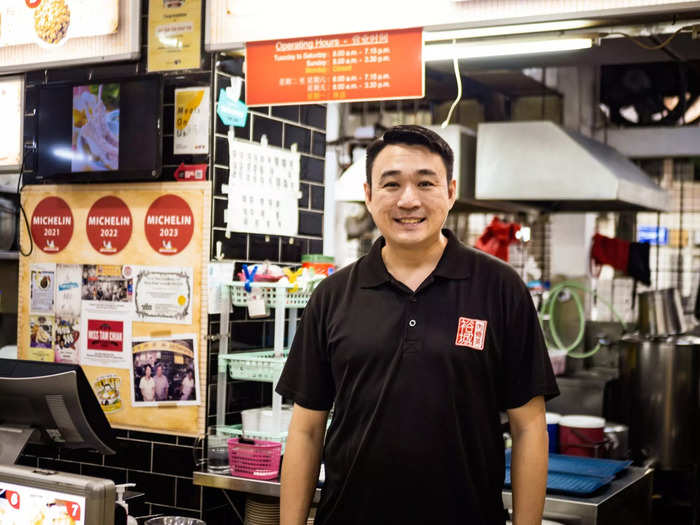
Chua Sim Huat first started Joo Siah Bak Koot Teh in 1985. Now, some 38 years later, his son, Quah, has taken over the reins and manages the eatery.
"My dad has always been a food lover. He learned the basics of bak kut teh and made his own tweaks to it," Quah told me.
I traveled to the western side of Singapore to meet up with Quah. His stall is set up about 10 miles from the city's center in a quiet neighborhood surrounded by public housing towers. I arrived in the late afternoon to find only a few people still eating — or perhaps catching an early dinner — on the plastic chairs and tables.
The food stall had humble beginnings. In the 1980s, a recession hit Singapore and Quah's father Chua lost his job as a site manager at a shipyard in northern Singapore. Determined to get back on his feet, Chua first started the bak kut teh stall in northern Singapore after spending three months learning how to master the dish from his brother-in-law. His father's goal at the time had been to survive the financial crisis, Quah said.
After running the stall for almost two decades, and passing his 55th birthday, Chua thought about retiring and closing the eatery for good. At first, none of his children could continue running the business as they each had their own careers, Quah said. That's when Quah decided to leave his job as a banker in portfolio risk management and take over the family business full-time.
Quah has now been running the eatery for 10 years, which has since moved to a new, larger location in Jurong East, the western Singapore neighborhood.
"My elder brother is a vegetarian, and my sister took her PhD, so neither of them were a fit," Quah said, adding that he "didn't mind" managing the family business.
Quah serves a type of bak kut teh that's unique to Singapore — for 7.20 Singapore dollars, or $5.30 a bowl.

Bak kut teh is associated with both Singaporean and Malaysian cuisines, although the dish originates from Fujian, China, according to the government site Singapore Infopedia. Hokkien immigrants then brought the dish to Singapore and Malaysia in the 1800s, per the site.
The name "bak kut teh" is a direct translation of the Hokkien phrase which means "meat bone tea," referring to the fragrant broth that's made with spices like star anise, garlic, and cloves.
The version that Quah serves is unique to Singapore, local food critic KF Seetoh told me on a phone call.
In Malaysia, bak kut teh is part of the local Hokkien fare and has a darker broth, thanks to salty ingredients like soy sauce. But in Singapore, the dish is part of the local Teochew cuisine, and the Teochews prefer their broth light in flavor and color too, using ingredients like garlic and white pepper, Seetoh, the author of Singapore's first food guide, said.
"If you go to Malaysia, you won't find this style commonly," Seetoh added.
And for Quah, Teochew-style bak kut teh is all about the white pepper.
Quah said the flavor shouldn't be overpowering and the tastes should be "delicately balanced."
Joo Siah Bak Koot Teh has been awarded the Michelin Bib Gourmand for three years in a row.
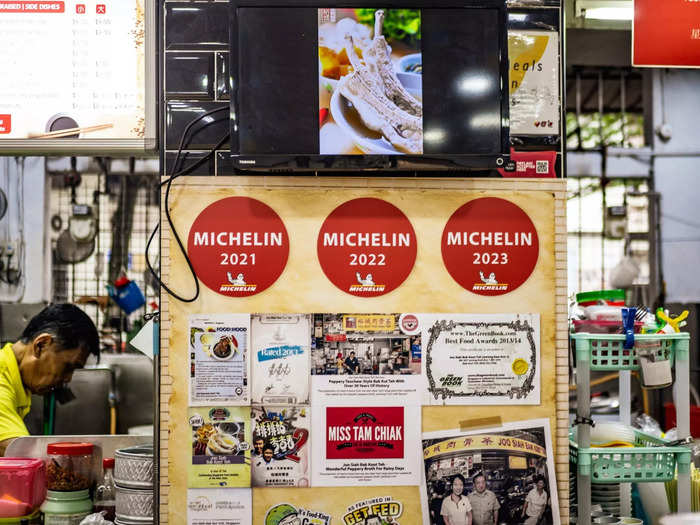
The Michelin Guide's Bib Gourmand is a list that rounds up the best eateries and restaurants serving food at an affordable price point. Michelin describes Bib Gourmand eateries as having "good quality, good value cooking."
In Singapore, most of the eateries on the Bib Gourmand serve casual, Singaporean cuisine from open-air food courts — or hawker centers — just like Quah's.
Quah's eatery was named in the 2021, 2022, and 2023 editions of the Bib Gourmand. He said the first time the eatery was awarded the Bib Gourmand he was surprised — he didn't even know about it until a friend sent him an article about the list.
"We feel good that the hard work that we've done has paid off, I mean, my dad has been doing this for over 30 years," Quah said, adding that he feels "proud" to be part of the esteemed list.
Despite his success, Quah is not planning to move to a restaurant setting.
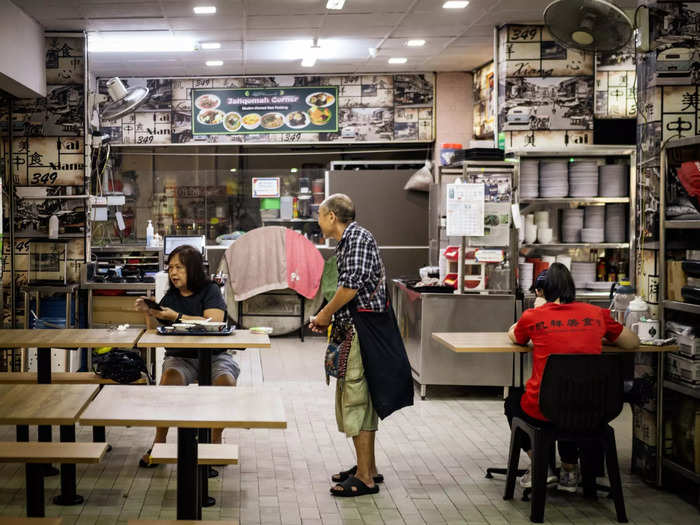
After several decades, the family-owned eatery still operates out of an open-air food court, Quah told me. In Singapore, many residents eat out at coffee shops, what's locally known as a kopitiam. These eateries are smaller and more compact than hawker centers, which are often sprawling, and can have over 100 stalls serving different types of cuisine. Kopitiams usually have a handful of specialty cooks serving up only a handful of dishes.
At that kopitiam where Joo Siah Bak Koot Teh is set up, there are only handful of other food stalls — Quah's bak kut teh shop is the biggest — and a small beverages shop that sells local coffee and teas.
Despite the popularity of Quah's eatery, he prefers to continue operating out of a coffee shop instead of moving into a restaurant-style location.
Seetoh, the food critic, told me that serving bak kut teh out of a coffee shop stall helps provide a more authentic experience to customers.
"The atmosphere, the layout of the kitchen, people stand there and see the pots boiling — all these are ingrained into their operational culture," Seetoh said.
Preparation for the broth starts early in the morning at 6 a.m. and it goes on to be cooked in batches.
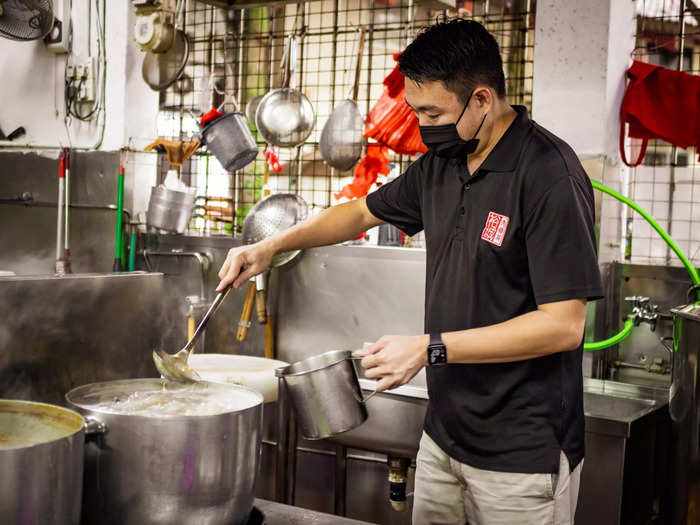
Making bak kut teh from scratch is becoming a rare trade, Seetoh told me. Nowadays, it's becoming more common for people to make the dish with powder and paste that's meant to mimic the flavors of the soup.
"I think within half a generation, people wouldn't know the original method of doing this," Seetoh said.
But Quah still does all the preparation from scratch, using fresh meat and ingredients — and a lot of time. The secret to great bak kut the, he said, is to cook in small batches so customers would get a freshly-cooked bowl — and not something that's stale and sitting around. The broth is cooked for about an hour to make sure the meat is soft and tender before being served, Quah said.
"Fresh meat is more expensive compared to the frozen ones," Quah said, adding that he and his parents have stringent quality control when it comes to the soup, tasting, and adjusting the taste with each batch.
Other dishes, including braised pork and pork innards, are also served at the stall.
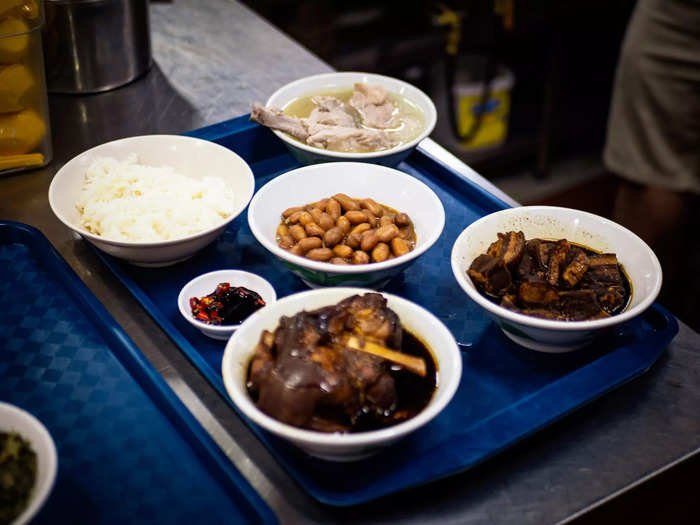
While Quah's eatery is best known for bak kut teh, other Teochew dishes like braised pork — a savory pork dish that's made with pork belly and meat, soy sauce, garlic, fennel, and spices like star anise and cloves. It's a dish that's fragrant and aromatic — and one of the eatery's signature dishes.
"It's even more difficult to cook the braised pork than the bak kut teh, but our customers keep coming back for it," Quah said.
Bak kut teh is often eaten with several other dishes, like white rice and braised peanuts — another popular dish at Quah's eatery. It's made with spices like cinnamon and cloves, fruits like dates, and Chinese ingredients like licorice root and five-spice powder.
"We want to prepare a complete meal for our customers to share with their family and friends. It makes our customers feel happier and more satisfied," Quah said.
I tried Quah's version of bak kut teh and the fresh pork ribs were the highlight for me.
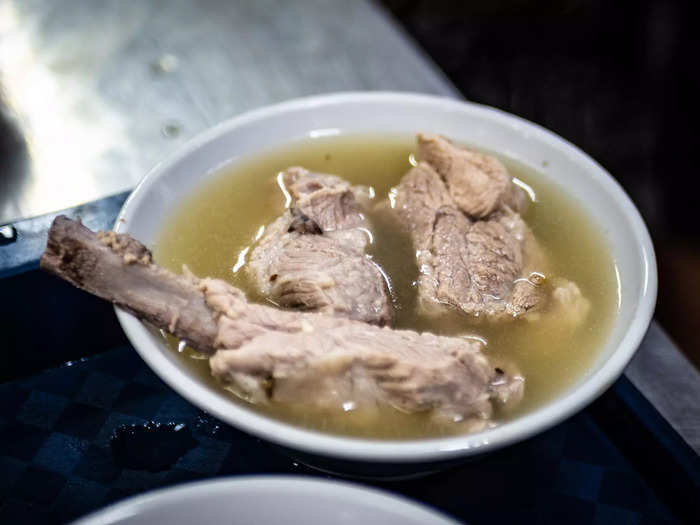
Seetoh told me that he expects distinct flavors from a good bak kut teh, specifically a kick of white pepper and a garlicky flavor. The meat, too, needs to be fall-off-the-bone tender.
And that's exactly what I got from Quah's bak kut teh — I could taste the white pepper right off the bat, and the garlic added a delightful depth to the broth. The pork was the star of the dish — it wasn't gamey, but perfectly cooked and incredibly tender. The ribs were well-seasoned with salt and complemented the subtle flavors of the broth. After a long day at work, it was the perfect comfort dish to fill me up.
I could see why Quah's stall has been awarded the Bib Gourmand three years in a row. Quah's bak kut teh was worth venturing out of the city center.
As for the eatery's future, Quah said he's focused on just making the best version of bak kut teh he can, and that his plans to expand can wait.
"I'm not sure if I'm ready," Quah said, adding that replicating the dish to the same standard at multiple stalls isn't easy.
"I just hope I can carry on this legacy and share Singapore food with others," he said.
Popular Right Now
Popular Keywords
Advertisement